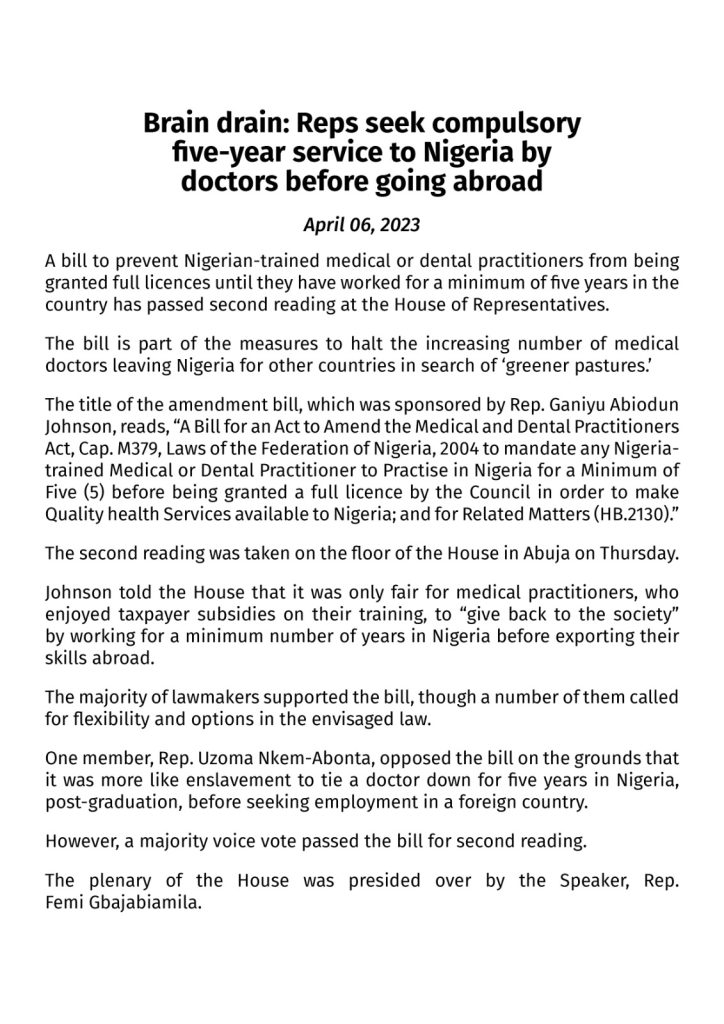Some elected members of the House of Representatives, the 9TH Assembly, has recently, proposed a bill to prevent Nigerian-trained medical or dental practitioners from being granted full licenses until they have worked for a minimum of five years in the country.
The bill, which has passed the second reading, has generated a lot of controversy and discussion, with some people in support of the bill and others against it.
The primary aim of the bill is to address the brain drain in the medical profession in Nigeria. It is a well-known fact that many Nigerian doctors and other healthcare professionals leave the country every year to seek better working conditions and higher pay in other countries. This brain drain has contributed to a shortage of medical personnel in Nigeria, which has negatively impacted the quality of healthcare in the country.
The bill seeks to address this problem by requiring Nigerian-trained medical and dental practitioners to work in the country for a minimum of five years before they can be granted full licenses to practice. The idea behind this is that by requiring these professionals to work in Nigeria for a few years, they will gain valuable experience and contribute to the improvement of the healthcare system in the country.
However, many people are opposed to the bill, arguing that it is unfair to restrict the mobility of medical and dental practitioners who have worked hard to obtain their degrees and qualifications.
More importantly, some also argue that the bill is unlikely to address the underlying causes of the brain drain, such as poor working conditions, low pay, and inadequate infrastructure.
There are also concerns that the bill may lead to unintended consequences. For example, it may discourage Nigerian students from studying medicine or dentistry in the country, knowing that they will be required to work in Nigeria for a minimum of five years after graduation. This could exacerbate the shortage of medical personnel in the country.
In conclusion, while the proposed bill to prevent Nigerian-trained medical or dental practitioners from being granted full licenses until they have worked for a minimum of five years in the country might appear well-intentioned, it is important to consider its potential impact on the medical profession and healthcare in Nigeria. It is essential to address the underlying causes of the brain drain in the medical profession in Nigeria and to improve the working conditions and infrastructure in the healthcare sector. Only then can we hope to retain our best medical personnel and provide quality healthcare to all Nigerians.

A bill to prevent Nigerian-trained medical or dental practitioners from being granted full licences until they have worked for a minimum of five years in the country has passed second reading at the @HouseNGR. pic.twitter.com/QpHDPbGFe9
— House of Reps NGR (@HouseNGR) April 6, 2023
-All Rights Reserved-
Permission to use any material, including text, still photograph, audio and video from this site is granted subject to permission being formally sought and, if granted, appropriate credit must duly be given to The News Room as the source.


 Stay connected, get exclusive updates, and be the first to know about all the exciting things happening. Whether you’re looking for insights, tips, or just want to be part of an amazing community, our WhatsApp group is the place to be!
👉 Don’t miss out. Click the link and be part of something awesome! 🚀
Stay connected, get exclusive updates, and be the first to know about all the exciting things happening. Whether you’re looking for insights, tips, or just want to be part of an amazing community, our WhatsApp group is the place to be!
👉 Don’t miss out. Click the link and be part of something awesome! 🚀




